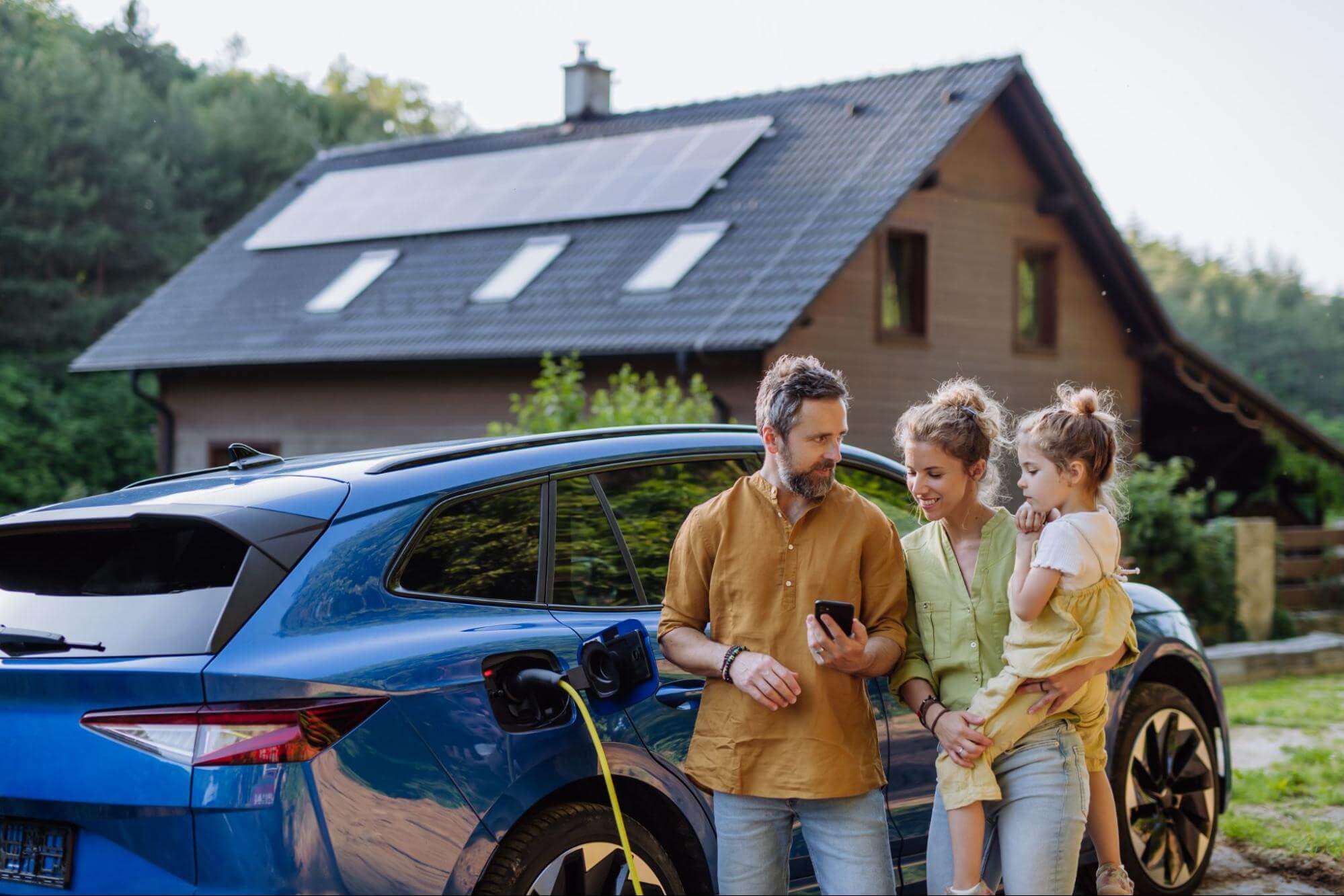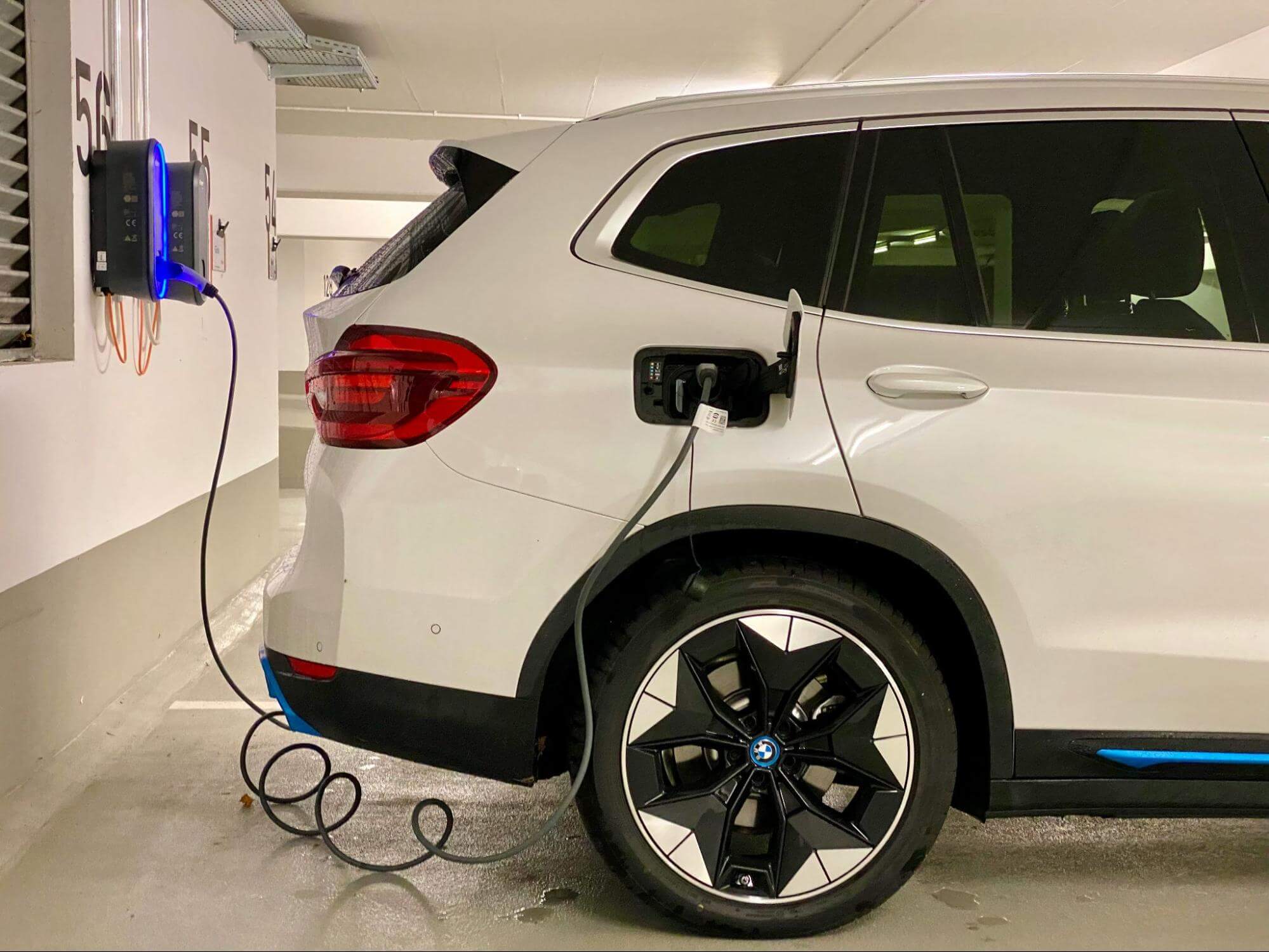In this guide, we’ll explore the essentials of solar panels for electric vehicles, providing you with the knowledge you need to make informed decisions about powering your EV with solar energy. Whether you’re a current EV owner considering solar integration or someone contemplating both purchases simultaneously, understanding the dynamics of solar-powered electric vehicles is crucial.
How many solar panels does it take to charge an electric vehicle?
Generally, homeowners may need anywhere from 5-12 solar panels to charge their electric vehicle from empty. However, most EV owners don’t charge their EV battery from zero every day.
How many miles do you drive in a day?
For instance, if you run on average 60 miles per day in your EV and your EV uses 1 kWh every 4 miles, you can ‘top up’ your EV battery by charging it with 15 kWh every day. That is not a big amount of energy to produce with a photovoltaic system.
If you have a 5 kilowatt (kW) system, you can generate that amount of energy in just over 3 hours of sunshine. If you have a 10 kW system, you could generate 15 kWh in just over 1.5 hours. These days solar panels range in size from 400 W to 550 W. If you have 400 W solar panels, you will need 25 panels to have a 10kw system.
What factors impact the amount of solar panels your EV will need
- Energy Consumption of the EV: The amount of energy your EV consumes determines how much electricity you need to generate from solar panels. This depends on factors such as the size of the EV’s battery, its efficiency and your driving habits.
- Solar Panel Efficiency and Output: The efficiency and output of solar panels vary depending on factors such as their technology, size, orientation, tilt angle and local weather conditions. More efficient panels or larger arrays will produce more electricity, requiring fewer panels to charge your EV.
- Available Sunlight: The amount of sunlight your location receives affects the energy production of solar panels. Homes with more sunlight will generate more electricity, while areas with less sunlight may require larger solar arrays to compensate.
- Charging Patterns: Your EV charging patterns, including how often you charge, the time of day you charge and your energy storage needs, will influence the size and configuration of your solar panel system.

How much does it cost to charge an electric vehicle?
While you don’t need to go to the gas pump twice a month, you will still need to charge your electric vehicle. Calculating the cost of charging your EV depends on multiple factors and can be somewhat complicated. Two main calculations help electric car owners think about the cost of charging.
The cost of charging a full battery
Simply multiply your car’s usable battery capacity by the cost of electricity to get the estimated cost of charging your vehicle. The true cost may vary due to a variety of factors, so use this as a guideline.
For example, if your EV battery’s usable is 75 kWh and the cost of electricity is $0.17 per kWh, the cost of charging your battery will be around $12.75.
The average EV owner may charge their vehicle 2-3 times per week, although it depends on how much the owner drives. Remember, you won’t always charge from empty.
The cost per 100 miles
The calculation is simple: multiply the vehicle’s consumption estimate — measured in kWh/100 miles — by the electrical cost per kWh. If an electric car’s consumption estimate is 30 kWh per 100 miles and the cost of electricity is $0.17 per kWh, the cost to charge is $5.10 per 100 miles.
How much does it cost to charge an electric vehicle with solar?
Once you have installed solar, the price of energy you use in your home and EV is locked in for around 25 years — depending on the warranty period. Eventually your system will produce more electricity than its original cost.
To calculate how much it costs to charge your electric vehicle with solar, you can simply divide the price of your solar system by the amount of energy (in kWh) that it will generate over 25 years.
Now compare that to the cost of energy from your utility and how rapidly their prices are going up. You can see why millions of people every year are deciding to power their homes and vehicles with solar.
Do I need a storage battery for my electric vehicle?
Many people drive home at the end of the day and charge their car as the sun goes down. Solar panels can only produce electricity during daylight hours, leaving EV drivers left to a storage battery system or the utility grid. As people charge their electric cars or otherwise use more electricity in the evening, many need to draw from the electrical grid — which can be expensive. If you add a storage battery to your solar system, you can continue to use low-cost, clean energy to charge your vehicle and power your evening activities.
For homeowners with higher Time-of-Use utility rates during evening hours, such as PG&E customers in Northern California, batteries can help you charge your vehicle without paying higher rates.
How much electricity does an electric vehicle need?
The full capacity of your EV battery is not the same as a full-tank of gasoline. Electric vehicles have a usable capacity that’s slightly less than their gross capacity. The reason the usable capacity is less than the gross capacity is to extend the life of the battery.
Different electric vehicle makes and models have different battery capacities, which can determine how much electricity your EV needs to charge. Additionally, the number of miles you drive will determine how much charging you will need to power your vehicle. Chances are, you won’t be charging your vehicle from empty to full every day.
The battery capacity of electric vehicles varies widely from model to model. American consumers can find EVs with usable capacities ranging from 30-kWh to 212-kwH.
Just like you don’t need to fill up with gas every day, you won’t need to charge your EV battery every day. Most manufacturers recommend keeping an electric vehicle between 20-80% to maximize battery efficiency.
I’m considering an EV, should I go solar first?
When you purchase your electric car, you won’t need to pay for gas and will save money charging your car when compared to paying at the gas pump. However, if you charge your car at home — your electrical bill will increase. Installing a solar energy system with your home charging station can help you power your car at a lower cost and maximize the environmental benefits of driving an EV. Once your solar system pays for itself, you can essentially power your EV for free.
If you are thinking about going solar, talk with an Enact energy advisor to understand how solar compliments your investment in electric vehicles. Enact designs custom quotes for homeowners based on their home, energy needs and future goals.
I have solar and considering purchasing an EV, do I need more panels?
These additional panels will help keep your utility bills low by powering your home and car. It can also be a good idea to evaluate whether you need to add a storage battery to your system if you don’t have one. Talk with an Enact energy expert to learn more about your situation and what might be the best course of action for your sustainability journey.
What are the benefits of using solar panels with an electric vehicle

Many Americans look to electric vehicles for reliable, sustainable transportation without needing to pay for gasoline. These benefits complement the benefits of home solar panels — and solar can enhance the benefits of driving an EV.
Increase cost savings
By generating your own electricity, you can significantly reduce the cost of charging your EV and reduce your reliance on the utility grid. Homeowners can lower their monthly bills and see savings grow overtime.
See more environmental benefits
Solar power is a renewable energy source, which means using solar panels to charge your EV can significantly reduce your carbon footprint. Without home solar panels, your EV is powered from the grid — which often relies on burning fossil fuels. To maximize the environmental benefits of your EV, use solar panels to charge your vehicle.
More convenient EV charging
A solar panel system installed at your home can provide convenient access to charge your electric vehicle without increasing your utility bill. When combining solar panels with a home battery, you can charge your vehicle using clean energy from the convenience of your home. You can charge your vehicle overnight or during the day, depending on your needs, without having to rely on public charging stations.
Energy independence
With solar panels, you become less dependent on the utility grid. This not only lowers your utility bills and carbon footprint, but can provide a sense of security and independence — especially during power outages, price fluctuations or grid disruptions.
How to get started with an Enact proposal

Enact is here to help homeowners who are considering solar, energy storage and an EV charging station. After scheduling a free consultation with an advisor, attach a copy of your last utility bill in an email with our advisors before your consultation and mention that you’re considering an EV or have an EV. This gives our advisors the ability to best serve your home’s energy needs.
An Enact proposal is custom to your home and situation. The proposal will detail how much energy your system can generate and estimated savings throughout the years. Our customers get a choice in their equipment and financing options, so we can find the right system and payment plan for you. Get started today with an Enact solar quote and enhance your EV journey.

